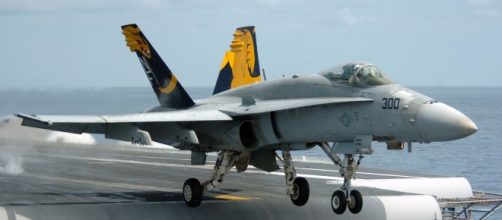Two recent incidents illustrate what a complicated mess Syria has become, with a multi-faceted Civil War with not two but several players fighting for territory and power. A United States Navy F/A-18E Super Hornet shot down a Syrian government Su-22 bomber that was dropping bombs on Syrian Democratic Forces, an American ally in the war against ISIS. Around the same time, Iran launched a missile barrage against ISIS forces in retaliation for an attack by the terrorist army outside the Iranian parliament building in Tehran. Iran is an ally of the Syrian government of Bashir Assad.
The United States is an enemy of both ISIS and Iran.
The final assault on Raqqa is proceeding
A coalition of Syrian rebel forces and Kurdish militias, armed and backed by the United States, is in the process of cutting off Raqqa, the capital of the so-called Islamic State. The strategy, as articulated by Secretary of State James Matthis, is to annihilate ISIS by killing as many of its jihadis as possible. The theory is that by taking that ISIS capital, rolling up the territory the terrorists control, and killing as many as possible will prevent ISIS fighters from fading into the countryside and showing up somewhere else, say Europe or the United States, to commit murder and mayhem.
In the meantime, the Russians claimed that they had killed Al-Baghdadi and some other senior ISIS leadership in an air strike.
The claim has not been confirmed by either American military or any other third parties. If Al-Baghdadi is dead, it would only serve him right for his numerous crimes against humanity. How such a development will affect the fight against ISIS remains to be determined. Al-Baghdadi will likely be replaced by another leader.
After ISIS, what happens next?
When ISIS is finally routed out of Syria (and Iraq where a separate campaign is being undertaken in and around Mosul), the question arises, what happens next? It is not in American interests that an Assad-led government, supported by Russia and Iran, reasserts itself in Syria. But continued chaos is not good either. Aside from the humanitarian disaster such a prospect entails, continued civil War In Syria will generate more refugees who, understandably, want to be elsewhere.
But Europe is already under stress by unassimilated migrants from the Middle East.
But nation building, presumably with a goal of a pro-western government in Syria, is a dubious exercise, as history has shown us. Finally, the wild card of Kurdish national aspirations has to be taken into account. The Kurds would like to have their own country in Iraqi, Syrian, and possibly Iranian and Turkish territory. Such a state would be pro-western but would have enemies at all corners.


